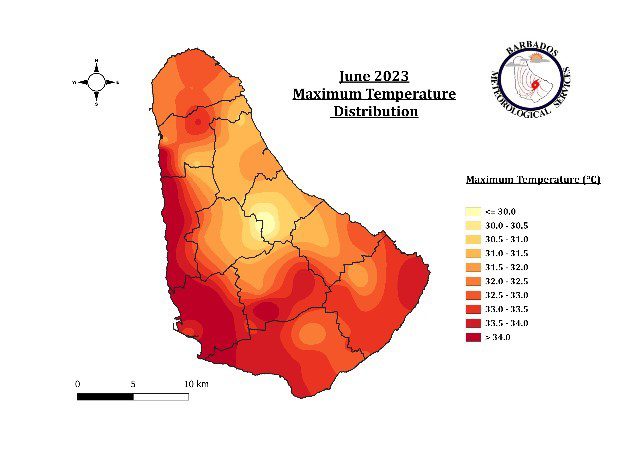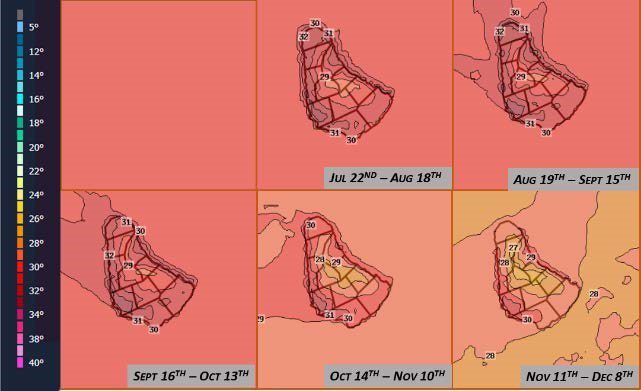
Heat:
According to a recent press release from the World Meteorological Organization (WMO), preliminary data indicated that the first week in July was the hottest week on record, following on from the hottest June on record, as the El Nino phenomenon was becoming established. These high temperatures have been bolstered by above average Sea Surface Temperatures in the Pacific and Atlantic Oceans.
This is a trend that we are also seeing here in Barbados, with maximum temperatures ranging between 30°C and 35°C from June 1st to July 13th, with higher temperatures along the western portions of the island. June 2023 has been one of the warmest on record, minimum temperatures and average temperatures have been record high for June, however, while no maximum temperature records were broken, the maximum temperature was just 0.1°C shy of the hottest June on record (2006, 32.7°C). Monthly minimum and average temperatures at the BMS were 27.7°C and 28.5°C respectively, which both exceeded the climatological norms of 25.2°C and 27.8°C respectively.
Model guidance indicates that this pattern is projected to continue until September/October as the heat season (typical between June and October) peaks, which fits with the climatic indicators of El Nino and particularly the above normal Sea Surface Temperatures.

Drought:
For the first time this year, the BMS at Charnocks recorded above normal rainfall accumulations, solely due to the passage of Tropical Storm Bret and the Tropical Wave which affected the island on the 22nd and 27th of June, 2023 respectively. These events have offered significant relief from the Agricultural drought. Below average rainfall is still expected up until about October, particularly across the southern portions of the island.
Note, these predictions can change, hence why we update them every month.
What does this mean?
- Although the rains have started, we still expect some dry periods, particularly along the southern sections of the island, which may negatively impact the agricultural sector for short periods during the coming months.
- Expect temperatures to peak in urban areas around 35°C to 36°C in the coming months, therefore, persons should ensure that they remain hydrated and follow best practices and recommendations from the Ministry of Health and Wellness. Nighttime temperatures will continue to be above average, thus in some cases making the nights relatively uncomfortable.

Recommended Response
- The public must continue to employ water conservation methods, as recommended by the Barbados Water Authority.
- Although foliage across the island has improved, farmers are encouraged to ensure that adequate cooling and fresh drinking water be made available for livestock. Please follow the guidance from the Ministry of Agriculture and Food Security.
